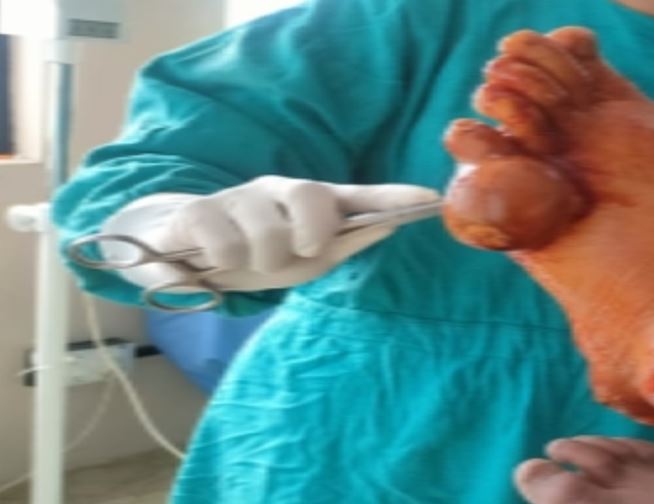Gouty Tophi Excision: Bridging Modern Surgery and Ayurvedic Wisdom
DOI:
https://doi.org/10.21760/jaims.10.3.55Keywords:
Gouty tophi, Chronic gout, Ayurveda, Vatarakta, Herbal formulationsAbstract
Gouty tophi are a hallmark of chronic gout, resulting from the deposition of monosodium urate (MSU) crystals in tissues, leading to granulomatous inflammation. Chronic tophaceous gout typically develops in long-standing hyperuricemia and may cause pain, deformity, infection, and functional impairment, often necessitating surgical intervention. From an Ayurvedic perspective, gout corresponds to Vatarakta, a condition involving an imbalance of Vata Dosha and Rakta Dhatu. Chronic cases with deeper joint involvement are classified as Gambhira Vatarakta. Management strategies include dietary regulation, detoxification therapies (Panchakarma), and herbal formulations aimed at reducing uric acid levels and inflammation. This case report presents a 59-year-old male with a 15-year history of hyperuricemia and progressive tophaceous swellings on his left foot, complicated by pain and pus discharge. Clinical examination revealed elevated uric acid levels (8.3 mg/dL). Surgical excision of the tophus at the fifth metatarsophalangeal (MTP) joint was performed under local anesthesia, resulting in symptom resolution. This case highlights the importance of early gout management to prevent chronic progression. While surgery provides effective symptomatic relief, long-term control of hyperuricemia through pharmacological, dietary, and Ayurvedic approaches remains essential to prevent recurrence and joint damage.
Downloads
References
https://www.pcds.org.uk/clinical-guidance/gouty-tophi
Singh JA. Challenges faced by patients in gout treatment: a qualitative study. Journal of Clinical Rheumatology : Practical Reports on Rheumatic & Musculoskeletal Diseases. 2014 Apr;20(3):172-174. DOI: 10.1097/rhu.0000000000000091. PMID: 24662562; PMCID: PMC4169366.
Ahmed S, Bailey J. Management of Acute and Chronic Gout – The Nephrology Perspective . Open Urology & Nephr J, 2016; 9: . http://dx.doi.org/10.2174/1874303X01609010007
Perez-Ruiz F, Carmona L, Yebenes MJ, et al. An audit of the variability of diagnosis and management of gout in the rheumatology setting: the gout evaluation and management study. J Clin Rheumatol. 2011;17:349-355.
https://www.pcds.org.uk/clinical-guidance/gouty-tophi
Talaat M, Park K, Schlesinger N. Contentious Issues in Gout Management: The Story so Far. Open Access Rheumatology : Research and Reviews. 2021 ;13:111-122. DOI: 10.2147/oarrr.s282631. PMID: 34012303; PMCID: PMC8126966.
Singh JA. Challenges faced by patients in gout treatment: a qualitative study. Journal of Clinical Rheumatology : Practical Reports on Rheumatic & Musculoskeletal Diseases. 2014 Apr;20(3):172-174. DOI: 10.1097/rhu.0000000000000091. PMID: 24662562; PMCID: PMC4169366.
Ahmed S, Bailey J. Management of Acute and Chronic Gout – The Nephrology Perspective . Open Urology & Nephr J, 2016; 9: . http://dx.doi.org/10.2174/1874303X01609010007
https://www.kidney.org/kidney-topics/refractory-gout-management
Sylvie Rogenmoser, A Mark H Arnold. Chronic gout: Barriers to effective management. Australian Journal for General Practitioners. The Royal Australian College of General Practitioners (RACGP). V 47, N 6, P 351-356, 2018. https://www1.racgp.org.au/ajgp/2018/june/chronic-gout
Shastri A, editor. Hindi commentary Ayurved Tattva Sandipika on Sushruta Samhita of Acharya Sushruta, Nidana Sthana; Vatavyadhi Nidanam: Chapter 1, Verse 12. Varanasi: Chaukhambha Sanskrit Sansthan series; 2006. p. 228.
Acharya Charak, Charak Samhita Chikitsa Sthana 29, Vaidyamanorama Hindi Commentary; Edited by Acharya Vidyadhar Shukla and Prof. Ravidutt Tripathi (2015), by Publishers Chaukhamba Sanskrit Pratishthan, Jawahar Nagar, Delhi. pg-730















